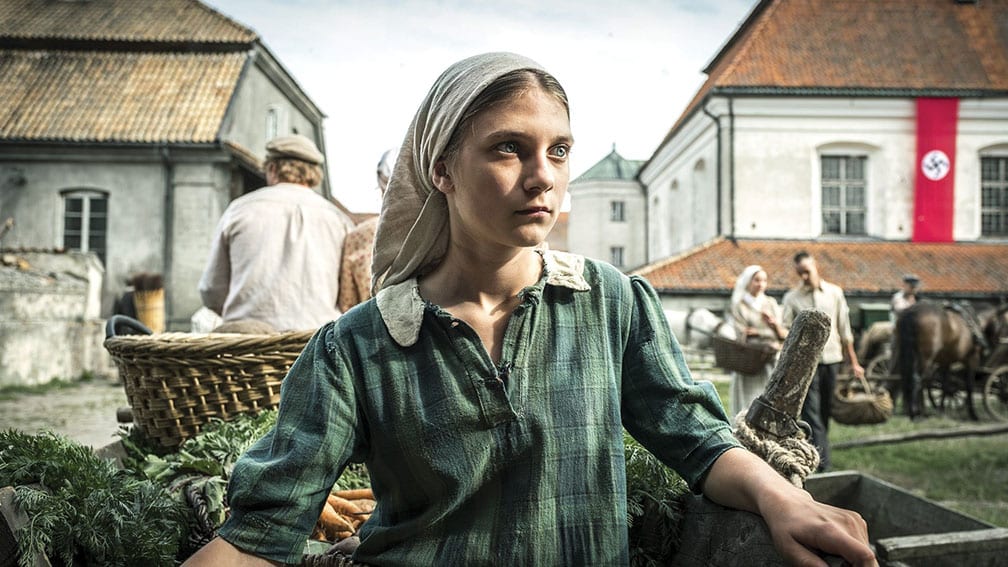
Three dead people hang from a tree with a sign that reads “We hid Jews.” It’s a scene that encapsulates the fear tactics the Nazis used to deter anyone from assisting the Jewish people during World War II.
The film “My Name Is Sara” tells the true and arduous story of a Jewish girl who survived by pretending not to be Jewish. It shows how Sara Góralniak (Zuzanna Surowy), a 12-year-old living in Poland, took refuge on a farm in Ukraine for two years while hiding every aspect of her Jewish identity. Every second that she was there she knew that if she were found, she and the family that protected her would be murdered.
“She was constantly living on eggshells that entire time, which is an obviously awful environment to have to live under,” said director Steven Oritt.
“She was constantly living on eggshells that entire time, which is an obviously awful environment to have to live under.” – Steven Oritt
Throughout the film, Sara endears herself to the family who allows her to work on their farm: Pavlo (Eryk Lubos), his wife Nadya (Michalina Olszańska) and their two young sons. Sara proves herself to be a capable farmhand and a non-Jew by reciting the Lord’s Prayer, eating pork, saying she’s 14 and even assuming a new name. She endures skepticism from the family that has taken her in, while also slowly proving herself useful and not threatening their safety.
There are scenes of animals being slaughtered, as is normal on any farm. But there’s humanity in those moments, which is in contrast to the graphic and sadistic threats and murders of the townspeople at the hands of the Nazis.
The ensemble is strong, making every peril Sara and the family confront vivid and poignant, their eyes and body language expressing the characters’ fear and determination. No moment illustrates this better than Sara, riding a horse drawn buggy into town with Pavlo and Nadya’s family, sees three townspeople hanging from a tree for hiding Jews. Both Nadya and Sara cover the two little boys’ eyes. Sara’s dreams of reuniting with her family turn to nightmares when their reunion is discovered by Nazis.
Surprisingly, the starring role of Sara was Surowy’s first time acting. Thrust into a movie set and working in English, which is not her first language, Surowy’s experience mirrors Sara’s. There’s a fear, a wariness, to her performance, that’s most effective when Sara, who had never worked on a farm or been away from her family, is forced to adapt to her new world.
“We weren’t going to make the film if we didn’t find somebody that we felt as though could pull it off,” said Oritt.
While the two previous films he directed were documentaries, this is the first scripted film Oritt’s directed. “When I first interviewed [the real] Sara, the first question I asked was ‘How does a child, a 12-year old, survive such a thing?’ Because it was an unimaginable event. How could she do this constantly, making the right choice happen? And she said immediately, ‘by listening and not talking.’”
The film is executive produced by Mickey Shapiro — the son of Sara Góralniak and Asa Shapiro — who was born in a displaced person’s camp. Sara survived, and her story was recorded for the archives of the USC Shoah Foundation before her passing in 2018. According to the USC Shoah Foundation, Mickey is involved in multiple charities and organizations dedicated to preserving the memory of the Holocaust.
Though it was screened at film festivals in 2019, “My Name Is Sara” is making its way across the country, playing in Los Angeles July 19 at the Museum of Tolerance at 7:30 p.m. There will be a question and answer session with director Steven Oritt and lead actress Zuzanna Surowy after the screening. Tickets can be purchased through the Museum of Tolerance: https://www.museumoftolerance.com/events/mynameissara.html.























 More news and opinions than at a Shabbat dinner, right in your inbox.
More news and opinions than at a Shabbat dinner, right in your inbox.